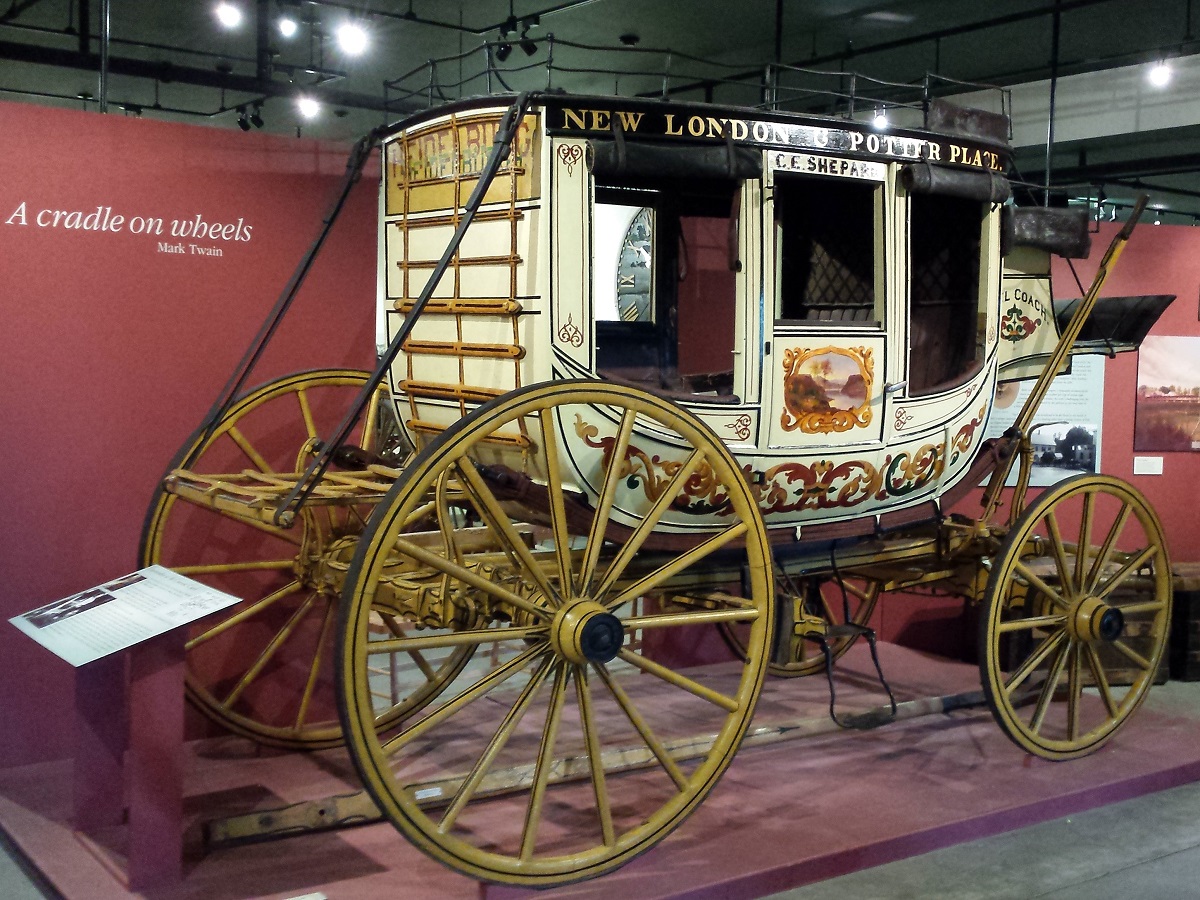C.E. Shepard Coach

This is the centerpiece of the Society's carriage and sleigh collection and sits at the front of the exhibit space. An icon of the American West whose image is now a trademark of the Wells Fargo Company and the New London Inn, these vehicles were built by the Abbot-Downing Company of Concord, NH. Between 1830 and 1900, the company shipped some 3,700 coaches, filling orders from all over the United States, Canada, Europe, Australia, South America, and Africa.
Considered one of the finest vehicles in the world, the Concord Coach had an innovative suspension system of thoroughbraces -- thick leather straps -- rather than steel springs, producing "an imposing cradle on wheels," according to passenger Mark Twain. The smoother ride did not prevent motion sickness, but it was still preferable to the bone-jarring ride offered by coaches of other designs. A new coach cost between $1,000 and $1,200, depending on capacity and other options. The decorative landscape paintings typically added to the door panels cost another $20, and were unique to each vehicle.
Coach #425 remained in New Hampshire -- first running in 1874 between Hopkinton and Concord. In 1882, the coach was purchased by Amos Whipple, who began twice-daily coach service between New London and the rail station at Potter Place, stopping at Scytheville (Elkins) and Wilmot Flat, enroute. The coach made summer travel to Mr. Whipple's new Heidelburg hotel more convenient -- just an hour's trip. In 1888, Charles E. Shepard joined Mr. Whipple as business partner and in 1893, Mr. Whipple left New London to seek his fortune in Boston, selling his shares of the coach business and the fledgling Potter Place and New London Telephone Company to Mr. Shepard, while he sold his share in the Heidleburg hotel to Mr. Shepard's brother-in-law, Wilfred Burpee. Mr. Shepard, with various partners, continued to operate the coach until 1911, when it was replaced by two Stanley Steamer automobiles. While the typical configuration was either a four-horse (two pair) or a six-horse hitch (three pair), Mr. Shepard preferred a five-horse hitch made up of two wheel horses (closest to the coach) and three lead horses, abreast.
In 1945, Mr. Shepard engaged Bud Lauridsen (newly graduated from Yale University School of Art) to restore the coach, and two years later Mr. Shepard presented the refurbished coach to Colby Junior College (now Colby-Sawyer College). In 1992, Charles Shepard's son, Maitland, was instrumental in arranging for the coach, then setting idle in a Colby-Sawyer barn, to be donated to the New London Historical Society. The coach was displayed in the Phillips Barn until its professional conservation by the American Conservation Consortium in Freemont, NH. Its return coincided with the completion of the Transportation Building. Concord Coach #425 is a local treasure and represents the culmination of hard work and concern of many Society members.
...